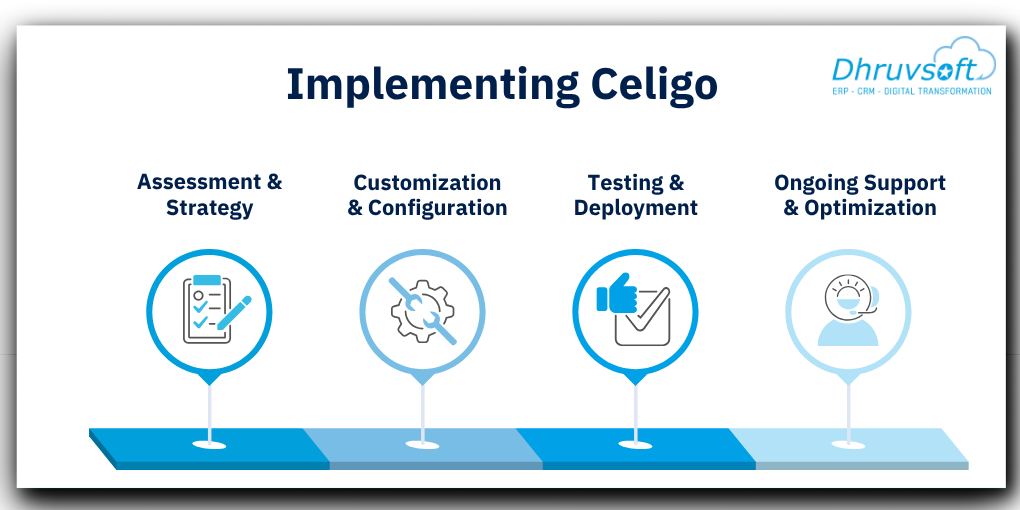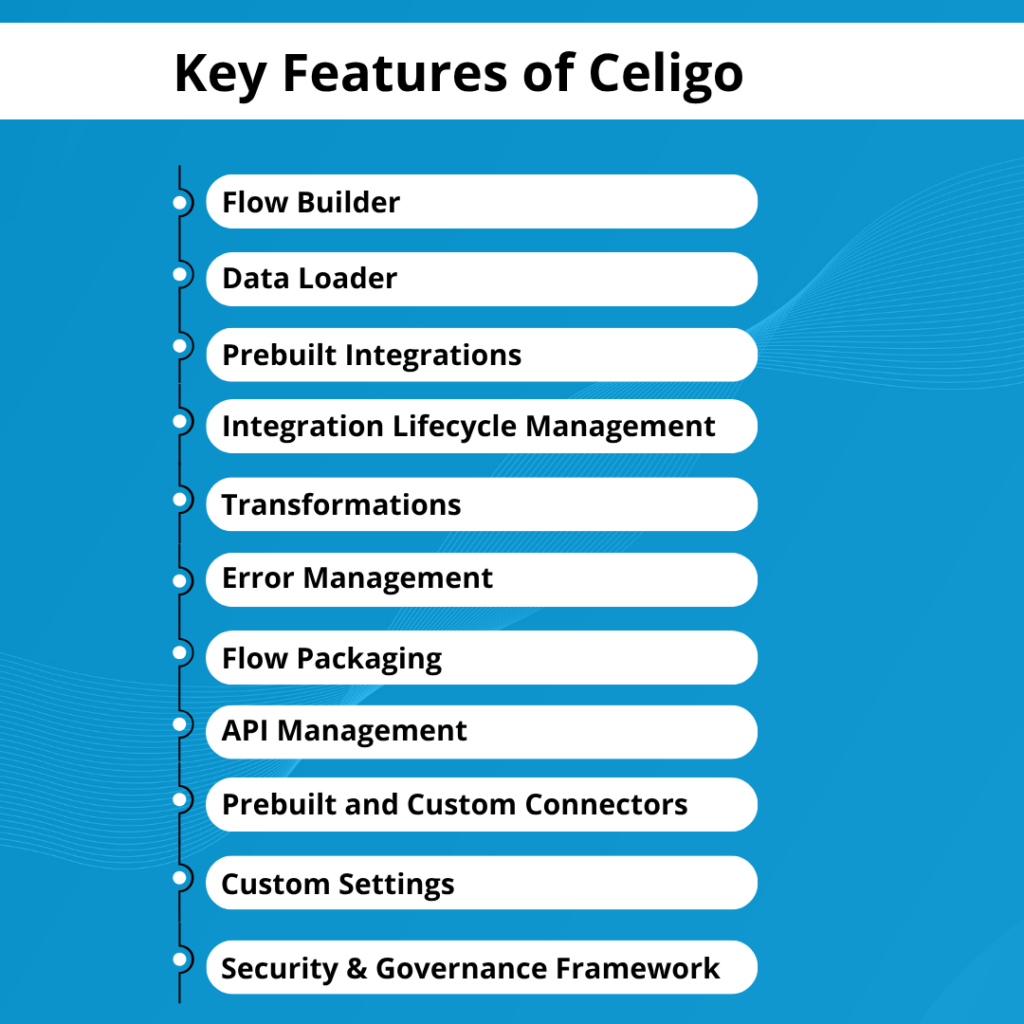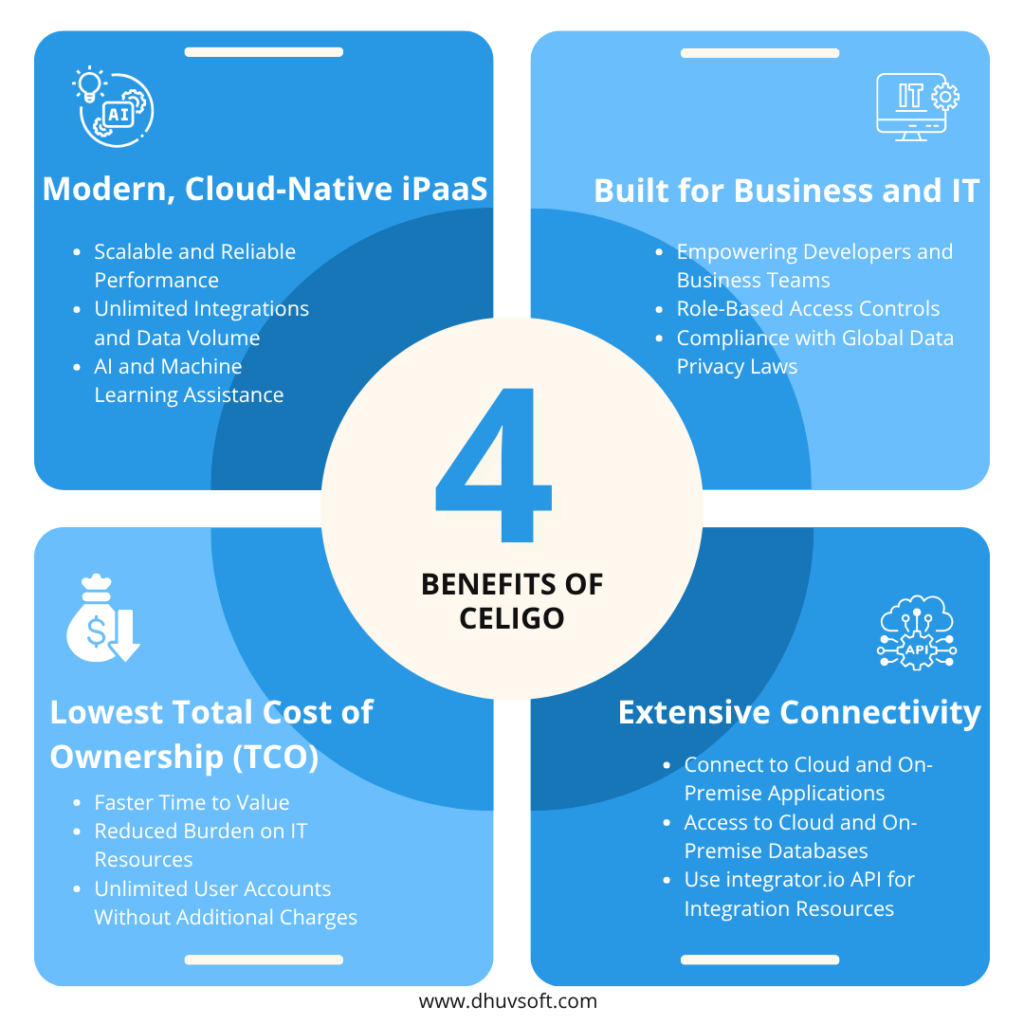
Celigo – Leading iPaaS Integration & Automation Platform
Modern businesses use multiple applications to manage their operations. However, when these systems are not connected, it leads to data silos, manual work, and inefficiencies. Celigo, a top Integration Platform as a Service (iPaaS), solves this problem by connecting different applications, automating workflows, and ensuring smooth data flow.
What is Celigo?
Celigo is a cloud-based integration platform designed to help businesses connect their software applications and automate workflows. It connects applications like NetSuite, Salesforce, Shopify, Amazon, and QuickBooks, making data exchange simple and error-free.
Celigo provides pre-built integrations, customizable connectors, and advanced automation tools, making it an ideal solution for businesses of all sizes. Whether integrating ERP, CRM, eCommerce, HR, or accounting systems, Celigo ensures a smooth data flow, improving decision-making and operational efficiency.
How Celigo Simplifies Automation for Businesses
In today’s business world, automation is the crucial factor for achieving success. Celigo helps organizations streamline operations by eliminating manual tasks, reducing errors, and improving productivity. Here’s how Celigo makes automation easy:
- Pre-Built Connectors: Celigo offers a vast library of pre-configured integrations for popular applications like NetSuite, Salesforce, Shopify, Amazon, QuickBooks, and more, allowing businesses to connect their tools effortlessly.
- Low-Code/No-Code Platform: With an intuitive, drag-and-drop interface, Celigo enables users with minimal technical knowledge to create and manage integrations without needing deep coding expertise.
- Scalable and Flexible: As businesses grow, their integration needs evolve. Celigo provides a scalable solution that supports increasing data volumes and complex automation workflows.
- AI-Driven Error Handling: Celigo detects and resolves integration errors in real time, ensuring uninterrupted business operations.
- End-to-End Workflow Automation: Businesses can automate entire processes, such as order-to-cash, procure-to-pay, and lead-to-customer, minimising human intervention and improving efficiency.
The Importance of Seamless Data Flow Between Applications
In a digitally connected world, real-time data flow is essential for businesses to operate smoothly. When systems work in isolation, organizations face data inconsistencies, delays, and inefficiencies that impact productivity and customer experience. Celigo guarantees uninterrupted data exchange through:
- Eliminating Data Silos: By integrating various systems, Celigo provides a unified data source, improving data accuracy and accessibility.
- Enhancing Customer Experience: Synchronizing customer interactions across CRM, eCommerce, and support platforms allows businesses to deliver personalized and timely responses.
- Boosting Financial Accuracy: Real-time data synchronisation between accounting, ERP, and payment systems reduces errors and improves financial reporting.
- Enabling Better Decision-Making: With accurate, up-to-date data, executives and managers can make informed business decisions based on real-time insights.
- Improving Compliance & Security: Celigo ensures secure data transfers while maintaining compliance with industry regulations like GDPR, HIPAA, and SOC 2.
Key Integration Challenges Faced by Modern Enterprises
As businesses adopt more digital tools, integrating them effectively becomes a major challenge. Here are the top integration challenges enterprises face today:
Data Silos
Celigo is a cloud-based solution that helps businesses integrate software apps and streamline workflows. When systems don’t connect, data silos form, leading to:
- Incomplete or duplicate data across platforms.
- Inefficient workflows and delayed operations.
Manual Processes
Without automation, businesses rely on manual data entry and processing, causing:
- Increased workload and operational delays.
- A higher risk of human errors affects data accuracy.
Scalability Issues
As businesses grow, their integration needs expand over a period of time. However:
- As the number of integrations increases, the management process becomes increasingly complicated.
- Older systems may have difficulty managing growing amounts of data.
Complex IT Management
Many integrations require constant IT support, leading to:
- Heavy reliance on IT teams for troubleshooting.
- High maintenance costs are slowing down innovation.
Lack of Real-Time Data Synchronization
Delayed or unsynchronized data leads to:
- Slow decision-making makes it hard for a business to move quickly and adapt.
- Outdated information causes operational inefficiencies.
Security and Compliance Concerns
Integrating multiple applications while maintaining security is a challenge:
- Sensitive data needs protection across all systems.
- Businesses must adhere to regulatory compliance standards like GDPR and HIPAA.
Data Quality Issues
Poor-quality data impacts business intelligence and decision-making:
- Inconsistent, duplicate, or missing data reduces accuracy.
- Low-quality data leads to flawed reports and insights.
Diverse Data Formats
Businesses use different tools that store data in varied formats, leading to:
- Problems can happen when new systems don’t easily work with existing ones.
- The necessity for data conversion and correlation.
Legacy System Integration
Issues can arise when new systems are not compatible with the ones already in use.
- Compatibility issues with cloud-based applications.
- Higher costs to upgrade or replace outdated technology.
Resource Constraints
Successful integration requires skilled professionals, but:
- Limited availability of IT experts slows implementation.
- Budget restrictions affect integration speed and efficiency.
Change Management Resistance
Employees often resist new integrations due to:
- Fear of learning new technology.
- Concerns about workflow disruptions.
Vendor Lock-In
Businesses relying on a single integration vendor face risks like:
- High switching costs if the vendor fails to meet evolving needs.
- Lack of flexibility and control over integrations.
Real-Time Data Processing Challenges
Synchronizing data in real-time can be complex due to:
- Large data volumes cause processing delays.
- Ensuring data coherence across various platforms poses a challenge.
Lack of Standardization
Different software solutions use varied integration protocols, leading to:
- Inconsistent communication between applications.
- Difficulties in maintaining cross-platform interoperability.
Monitoring and Maintenance Difficulties
Even after integration, businesses must ensure smooth operations:
- Continuous monitoring is needed to prevent disruptions.
- Maintaining integrations can be resource-intensive.
Key Features of Celigo
Flow Builder:
- Visual Modelling of Data Processing: Design and visualize data flows using an intuitive interface, simplifying the creation and management of complex integrations.
- Developer Tools: Utilize advanced tools such as Handlebars, JavaScript, and stacks to customize integrations, allowing for tailored solutions to specific business needs.
- Orchestration Control: Manage the sequence and timing of data flows, ensuring that processes occur in the correct order and at appropriate intervals.
Data Loader:
- Data Import: Easily import data files into applications like NetSuite and Salesforce, facilitating seamless data migration and integration.
Prebuilt Integrations:
- Integration Apps and Templates: Access a library of prebuilt connectors and templates to quickly synchronise data between systems, reducing development time and effort.
Integration Lifecycle Management:
- Iterative Development: Build, test, and deploy integrations in stages, allowing for continuous improvement and adaptation to changing business requirements.
Transformations:
- Data Preparation: Format and transform source records to align with the destination system’s structure, ensuring data consistency and integrity.
Error Management:
- Notifications and Dashboards: Monitor integrations in real-time with dashboards and receive alerts for any issues, enabling prompt resolution.
- Bulk Retry Operations: Efficiently retry multiple failed operations simultaneously, minimising downtime and maintaining data flow.
- Auto-Resolve Errors Using ML/AI: Leverage machine learning and artificial intelligence to automatically detect and resolve common errors, enhancing system reliability.
Flow Packaging:
- Cloning and Distribution: Easily clone existing flows and distribute integrations as templates, promoting reuse and standardisation across the organization.
- Sandbox Testing: Test integrations in sandbox environments before deploying to production, ensuring functionality and reducing the risk of errors.
API Management:
- API Lifecycle Management: Create, deploy, and monitor APIs to expose data and services securely, extend the digital platform, and foster new communication channels.
Prebuilt and Custom Connectors:
- Access to Popular Endpoints: Connect to a wide range of applications and services using prebuilt connectors, facilitating seamless integration.
- Universal Connectors: Utilize universal connectors supporting protocols like HTTP, FTP, and AS2 to integrate with virtually any system, enhancing flexibility.
Custom Settings:
- Personalized Configuration: Add custom settings and configuration options to integrations, allowing for tailored functionality that meets specific business requirements.
Security & Governance Framework:
- Data Privacy and Security: Use strong security measures, like encryption and authentication, to protect sensitive data and meet industry standards.
Benefits of Celigo
Celigo offers a comprehensive integration platform as a service (iPaaS) designed to streamline business processes and enhance operational efficiency. Here’s an expanded overview of its key benefits:
Modern, Cloud-Native iPaaS:
- Scalable and Reliable Performance: Celigo’s platform ensures robust performance with high uptime, allowing businesses to operate without interruption.
- Unlimited Integrations and Data Volume: There are no practical limitations on the number of concurrent integrations or the volume of data processed, enabling businesses to scale operations seamlessly.
- AI and Machine Learning Assistance: The platform leverages artificial intelligence and machine learning to manage and assist in integrations, enhancing efficiency and reducing manual intervention.
Built for Business and IT:
- Empowering Developers and Business Teams: Celigo provides an approachable user experience for business users to create and manage automations while offering a robust interface for developers to build complex integrations.
- Role-Based Access Controls: The platform features role-based access controls to guarantee that only approved team members can create or modify integrations, thereby boosting security and regulatory compliance.
- Compliance with Global Data Privacy Laws: Celigo is designed with enterprise-grade data security, including single sign-on (SSO) and multi-factor authentication (MFA), to comply with global data privacy regulations.
Lowest Total Cost of Ownership (TCO):
- Faster Time to Value: Business teams can create and modify their own integrations to meet changing processes without relying heavily on development resources, accelerating time to value.
- Reduced Burden on IT Resources: Developers can rapidly create and modify complex integrations, increasing efficiency by 50% or more, thereby reducing the workload on IT departments.
- Unlimited User Accounts Without Additional Charges: Celigo’s pricing model allows for unlimited user accounts with no additional charges, encouraging widespread adoption across the organization.
Extensive Connectivity:
- Connect to Cloud and On-Premise Applications: Celigo offers flexible API connections to hundreds of applications out of the box, facilitating seamless integration with both cloud-based and on-premise systems.
- Access to Cloud and On-Premise Databases: The platform enables access to both cloud and on-premise databases, ensuring data is readily available across various environments.
- Use integrator.io API for Integration Resources: Celigo’s integrator.io API allows users to access or run integration resources from an HTTP request, providing flexibility in managing integrations.
Why Celigo Integration is Essential for Smooth Business Automation and Efficiency
Enhanced Operational Efficiency
- Automated Business Processes: Celigo streamlines business processes from start to finish, eliminating manual tasks and minimizing mistakes. This automation frees up employees to concentrate on high-level projects.
- Low-Code Environment: The platform offers a low-code environment, enabling faster deployment of integrations and business process automation (BPA) flows. This accessibility enables both technical and non-technical users to construct and oversee integrations with ease.
Improved Data Quality
- Data Accuracy and Consistency: Celigo ensures accurate, complete, and consistent data across integrated systems. By automating data validation and cleansing, the platform reduces data errors and enhances overall data quality.
- Error Reduction: Celigo automates validation and compliance checks, eliminating common transaction errors, cutting data mistakes by 50%, and reducing error resolution time by 90%.
Cost Savings
- Reduced Administrative Expenses: By automating manual processes, Celigo reduces administrative expenses and processing delays, leading to significant cost savings.
- High Return on Investment (ROI): Businesses implementing Celigo’s iPaaS have achieved a return on investment (ROI) of 364% over three years, demonstrating the platform’s effectiveness in driving financial benefits.
Streamlines Business Operations
- Comprehensive Integration Platform: Celigo connects disparate applications, facilitating seamless data flow and unified operations. This integration ensures that data remains consistent and synchronised across all applications, allowing for better-informed decision-making and strategic planning.
- Business Process Automation: The platform automates end-to-end business processes, reducing manual interventions and accelerating workflows. This automation enables businesses to respond faster to needs and improve overall efficiency.
- Data Quality Enhancement: Celigo emphasises data quality, ensuring accurate, complete, and consistent information across systems. This focus on data integrity leads to more reliable reporting and analytics.
Automation in Eliminating Bottlenecks
- Reduced Manual Processes: Celigo eliminates repetitive tasks, freeing up employee time for strategic activities and reducing human errors. This shift allows staff to focus on higher-value tasks that drive business growth.
- Accelerated Transactions: By automating data exchanges and workflows, Celigo leads to faster transaction processing and improved customer satisfaction.This acceleration boosts the overall customer satisfaction and operational productivity.
- Scalability: Celigo supports business growth by efficiently handling increasing data volumes and complex integrations. The platform’s scalability ensures that businesses can expand without facing integration bottlenecks.
Celigo for Your Industry

E-commerce
- Automates order processing by integrating e-commerce platforms with backend systems, reducing manual interventions.
- Ensures inventory levels are consistently updated across all sales channels in real-time, eliminating stock discrepancies.
- Combines customer data to create tailored shopping experiences and targeted marketing campaigns

Healthcare
- Ensures patient data exchange complies with healthcare regulations, safeguarding sensitive information.
- Facilitates seamless data exchange between disparate healthcare applications, improving coordination.
- Provides healthcare professionals with accurate and up-to-date patient information, enhancing decision-making.

Retail
- Connects point-of-sale systems with backend software, providing real-time sales data and inventory tracking.
- Enhances customer relationships by integrating CRM systems to boost loyalty programs and customer interaction.
- Provides a unified customer experience by integrating systems across all online and offline platforms.
Implementing Celigo
At dhruvsoft, we use the following methodology for Celigo implementations

- Assessment & Strategy: Evaluating existing systems and defining integration goals to align with business objectives. Identifying key processes that require automation for enhanced efficiency.
- Customization & Configuration: Adapting Celigo to specific business workflows for seamless data synchronisation. Configuring role-based access and automation rules to optimize performance.
- Testing & Deployment: Conduct rigorous testing to ensure accuracy, security, and functionality before going live. Deploying integrations in phases to minimize disruptions and ensure smooth adoption.
- Ongoing Support & Optimization: Providing continuous monitoring, updates, and troubleshooting to maintain system efficiency. Enhancing integrations with new features and improvements based on evolving business needs.
Why Choose Dhruvsoft for Celigo Integration
- Expertise in Celigo Integration: Dhruvsoft has a track record of successfully implementing Celigo across various industries. Our team provides customized integration solutions that fit perfectly into our clients’ business processes.
- Tailored Solutions: We design customized integration strategies that align with your unique business needs. Our approach ensures maximum efficiency and minimal disruptions during implementation.
- Seamless Implementation: Our experts handle end-to-end deployment with precision, reducing operational downtime. We follow best practices to ensure smooth transitions and system compatibility.
- Ongoing Support & Maintenance: We offer ongoing monitoring, issue resolution, and improvement services after deployment. Our dedicated support team ensures your integrations run efficiently at all times.
- Data Security & Compliance: We strictly follow industry guidelines to guarantee secure data management and maintain regulatory compliance. Our solutions help businesses meet GDPR, HIPAA, and other regulatory requirements.
- Cost-Effective Services: Dhruvsoft optimises integration processes to maximize ROI while keeping costs low. Our solutions reduce manual work, improve accuracy, and enhance operational efficiency.
- Multi-Industry Experience: We bring expertise in E-commerce, Finance, Healthcare, Retail, Manufacturing, and more. Our deep industry knowledge helps us deliver impactful integration solutions tailored to your sector.
FAQs on Celigo
What is Celigo, and how does it work?
Celigo is an integration platform that streamlines business operations by linking various applications, facilitating smooth data exchange and synchronization.
What applications can Celigo integrate with?
Celigo connects with a broad spectrum of applications, encompassing ERP systems such as NetSuite, CRM platforms such as Salesforce, e-commerce solutions such as Shopify, and accounting software like QuickBooks.
How long does it take to implement Celigo?
Implementation time varies depending on the complexity of integrations, but Celigo’s pre-built connectors allow for faster deployment compared to traditional integration methods.
Is Celigo a good fit for small enterprises?
Yes, Celigo is designed for businesses of all sizes, offering scalable integration solutions that automate workflows and improve efficiency.
How does Celigo ensure data security?
Celigo adheres to established security best practices, incorporating encryption, role-based access restrictions, and adherence to data safeguarding laws.
Can Celigo handle real-time data synchronisation?
Celigo indeed facilitates real-time data synchronisation, guaranteeing that all connected systems have access to the latest information at all times.
Does Celigo offer pre-built integration templates?
Celigo offers pre-configured templates and connectors for widely used applications, thereby shortening the implementation process and minimizing the required effort.
How customizable is Celigo for specific business needs?
Celigo offers extensive customization options, allowing businesses to create tailored integrations that align with their unique processes.
What kind of support does Dhruvsoft offer for Celigo users?
Dhruvsoft provides end-to-end Celigo integration services, including implementation, customization, troubleshooting, and ongoing support.
What steps can Celigo take to streamline your operations?
Celigo automates repetitive tasks, eliminates data silos, and ensures seamless integration between applications, leading to improved productivity and decision-making.
Start Your Celigo Integration with Dhruvsoft Today!
Unlock the full potential of Celigo with Dhruvsoft’s expert integration services. Our team ensures a smooth, efficient, and customized implementation tailored to your business needs. Contact us today for a consultation and take the next step toward seamless automation and enhanced efficiency.






